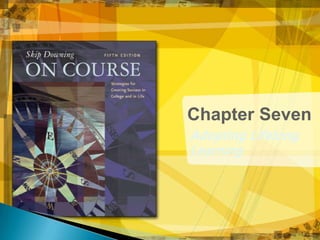
Stu 150 Ch 7 Lifelong Learning
- 2. Copyright © Houghton Mifflin Company. 7| All rights reserved. 2
- 3. Focus Questions ◦ How does the human brain learn? *Neurons send out electrical signals. If signals are strong enough and repeated enough then memories are created. ◦ How can you use this knowledge to become a highly effective learner? ◦ Summer amnesia, Spring break amnesia, day-to- day amnesia? Copyright © Houghton Mifflin Company. 7| All rights reserved. 3
- 4. Copyright © Houghton Mifflin Company. 7| All rights reserved. 4
- 5. Copyright © Houghton Mifflin Company. 7| All rights reserved. 5
- 6. Copyright © Houghton Mifflin Company. 7| All rights reserved. 6
- 7. Have you ever learned something simply because you liked it? What do we do differently when learning things that we are interested in vs. things that we are not interested in? Copyright © Houghton Mifflin Company. 7| All rights reserved. 7
- 8. 1. Prior Learning 2. Quality of Processing 3. Quantity of Processing Copyright © Houghton Mifflin Company. 7| All rights reserved. 8
- 9. Have you ever learned something for the first time that was difficult? Did you ever re-visit that thing only to find that it was easier the second time? Copyright © Houghton Mifflin Company. 7| All rights reserved. 9
- 10. Ideas for deep processing: Skim a chapter, make questions Create a concept map Discuss with classmate Participate, controlling your thoughts Make a test Teach someone Copyright © Houghton Mifflin Company. 7| All rights reserved. 10
- 11. Time taken to learn Distributed over time Long study sessions often don’t work. Copyright © Houghton Mifflin Company. 7| All rights reserved. 11
- 12. Focus Questions ◦ What is your preferred way of learning? ◦ What can you do when your instructor doesn’t teach the way you prefer to learn? Copyright © Houghton Mifflin Company. 7| All rights reserved. 12
- 13. A) Thinking Learners B) Doing Learners C) Feeling Learners D) Innovating Learners Copyright © Houghton Mifflin Company. 7| All rights reserved. 13
- 14. Learn well from instructors. Do well with power points, textbook reading, logical skills, debates. Uncomfortable with answers based on, tradition, emotion, logic and intuition. Do well with analyzing dissecting and using logic. Good notes, make questions, ask instructor. Copyright © Houghton Mifflin Company. 7| All rights reserved. 14
- 15. Want to know ‘how’ things work. Think logically, need models/examples. Hands-on, labs. Uncomfortable with theories, emotion, personal opinions or intuition. Unbiased, take action, follow procedures. Come up with q’s and find answers. Copyright © Houghton Mifflin Company. 7| All rights reserved. 15
- 16. Want to know: why they need to know? And who is going to teach it? Or who else is in the class? Like personal connections, value feeling, group work, sharing experiences. Uncomfortable with facts and data, prefer feeling and opinions. Copyright © Houghton Mifflin Company. 7| All rights reserved. 16
- 17. What if …? What else…? Concerned with taking something and making it better, new possibilities. Like independent projects, flexibility in rules and assignments, optional assignments. Honor imagination and intuition, uncomfortable with abstract theories and cold hard facts/data. Copyright © Houghton Mifflin Company. 7| All rights reserved. 17
- 18. While memorizing: Organize the information in a meaningful way.(9-8-4-1)=(1984) Game 1 Game 2 Copyright © Houghton Mifflin Company. 7| All rights reserved. 18
- 19. Associations. (Pavlov = slobbering dogs) Third-eye-blind: Copyright © Houghton Mifflin Company. 7| All rights reserved. 19
- 20. Visualization Concrete Words alligator - apple - arrow - baby - bird - book - butterfly - Abstract Words anger - belief - boredom - chance - concept - effort Nonsense Words ator - botam - crov - difim - firap - glimoc - Copyright © Houghton Mifflin Company. 7| All rights reserved. 20
- 21. Chaining: Copyright © Houghton Mifflin Company. 7| All rights reserved. 21
- 22. Loci. (association w/places) Devised during the Roman Empire, the method of loci uses the chaining method with a twist. Now all the items to-be- remembered are linked to specific places in the order you would visit them. For example, you might think of the route you Things to remember: take to school: Your room Your kitchen alligator Front door of your house Bus stop apple Bus seat arrow Friend's house that you see from the bus baby Gas Station that you see from the bus bird Market that you see from the bus School book car Copyright © Houghton Mifflin Company. 7| All rights reserved. 22
- 23. Acronyms. (AOL, NPR, USA, SVU, OICU812) Sentence acronym. (Four qualities of effective visualizing: Relax, use Present tense verbs, use all 5 Senses, include Feelings. = Real People Seek Freedom) Assign a number. (4 E’s) Visualize (bones of a hand) Concept map. Recite Copyright © Houghton Mifflin Company. 7| All rights reserved. 23
- 24. Create and listen to audio recordings. Use several senses while learning. Copyright © Houghton Mifflin Company. 7| All rights reserved. 24
- 25. Subject: Spanish AR verbs Endings: -o,-as,-a,-amos,-an Subjects: I, you (f), you/he/she, we, they (I) Hablar= Hablo (She) Hablar= Habla Copyright © Houghton Mifflin Company. 7| All rights reserved. 25
- 26. How can you memorize that information quickly? In groups discuss and memorize the information. Copyright © Houghton Mifflin Company. 7| All rights reserved. 26
- 27. Spanish AR verbs Endings: -o,-as,-a,-amos,-an Subjects: I, you (f), you/he/she, we, they (I) Hablar= Hablo (She) Hablar= Habla Copyright © Houghton Mifflin Company. 7| All rights reserved. 27
- 28. How do you say: I speak He speaks They speak You (f) speak We speak Copyright © Houghton Mifflin Company. 7| All rights reserved. 28
- 29. Bye now. Check out: neuroscience for kids Copyright © Houghton Mifflin Company. 7| All rights reserved. 29
